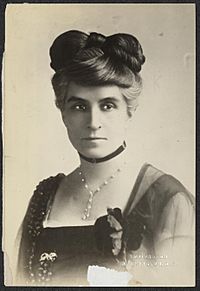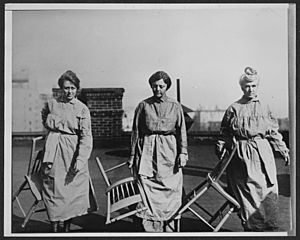Eunice Dana Brannan facts for kids
Quick facts for kids
Eunice Dana Brannan
|
|
|---|---|

Eunice Dana Brannan in 1915
|
|
| Born |
Eunice Mignon Dana
August 27, 1854 |
| Died | November 24, 1936 |
| Occupation | Suffragist |
| Political party | National Woman's Party |
| Parent(s) | Charles A. Dana Eunice Macdaniel |
Eunice Dana Brannan (1854-1937) was a brave activist who fought for women's right to vote. She was a key leader in the movement for women's suffrage in New York City. Eunice helped organize protests at the White House. These protests aimed to convince President Woodrow Wilson to support women's voting rights.
Contents
Early Life and Family
Eunice Dana Brannan was born on August 27, 1854. Her birthplace was Westport, Connecticut. Her parents were Charles A. Dana and Eunice Macdaniel. Eunice was the youngest of their four children. Her parents met at a special community called the Brook Farm Association. This was a place where people lived and worked together. Later, her father, Charles Dana, started a newspaper called the New York Sun.
In 1882, Eunice married Dr. John Winters Brannan. He was a doctor and led the Board of Trustees at Bellevue Hospital. They had three children together. One of their daughters also became involved in the women's rights movement.
Fighting for Women's Rights
In the early 1900s, Eunice Brannan visited England. There, she saw how women activists spoke publicly to share their ideas. This way of speaking, often from a "soapbox," inspired her.
Joining the Movement
Eunice became one of the first members of the Women's Political Union. This group worked for women's right to vote. Harriot Stanton Blatch led the Union. Eunice was the treasurer, managing the group's money. In 1910, she even opened a shop to raise funds for the cause.
In 1915, Eunice joined the leadership team of the Congressional Union for Women's Suffrage. During this time, she met with President Woodrow Wilson. She was part of a group of women who asked him to support a new law. This law would allow women across the country to vote. By 1917, she was a board member of the National Women's Party. She also became the leader of its New York branch.
Protesting at the White House
Eunice Brannan was arrested two times for protesting. She picketed outside the White House. This was to show her disagreement with President Woodrow Wilson. He did not support a law to give women the right to vote.
Her first arrest was on November 10, 1917. She led 41 protesters to the White House. They were protesting because Alice Paul, a leader of the National Women's Party, had been put in jail. The judge later pardoned Eunice and the other women. This meant they were forgiven.
Just a few days later, on November 14, 1917, she was arrested again. She was part of a group of peaceful protesters. They were known as the Silent Sentinels. Eunice and the other women were sentenced to 60 days in the Occoquan Workhouse. When they arrived at the prison, the guards treated them very roughly. This night became known as the "Night of Terror."
Release and Legacy
Eunice Brannan was released from prison early. A trial decided that the women were not guilty under the law. Her husband, Dr. John Winters Brannan, spoke at the hearing. His testimony helped the judge decide to find them not guilty. Eunice was one of only three women who agreed to be released early. She worried that staying in such harsh conditions could harm her health. Most of the other women stayed in jail for their full sentences.
Eunice Dana Brannan's dedication helped women gain the right to vote in the United States. Her actions showed great courage and strength.
Images for kids
 | Precious Adams |
 | Lauren Anderson |
 | Janet Collins |



